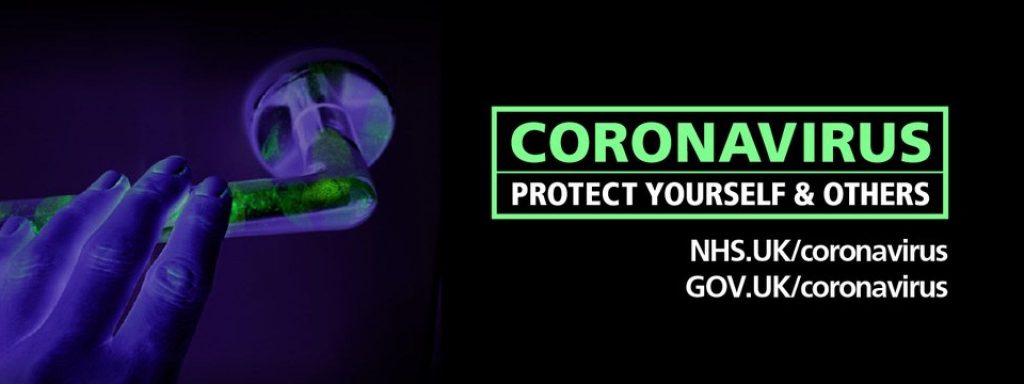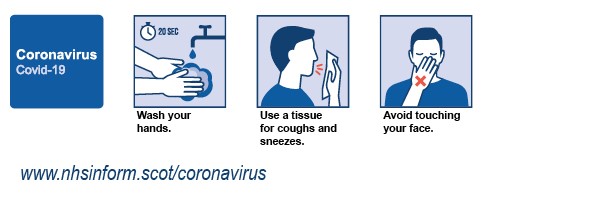Coronavirus (COVID-19) Information and Advice

This post includes information you need to know about Coronavirus (COVID-19), but for more advice head to the NHS Inform website.
Coronavirus (also known as COVID-19) is a new illness that can affect your lungs and airways.
Typical symptoms include a new continuous cough and/or a high temperature (37.8C or greater).
Generally, coronavirus can cause more severe symptoms in people with weakened immune systems, older people, and people with long-term conditions like diabetes, cancer and chronic lung disease.
COVID-19 is a new strain of coronavirus first identified in Wuhan City, China. This is a rapidly changing situation which is being monitored carefully.
You can keep up to date on latest advice about coronavirus from the NHS Inform website.
You can reduce your risk of catching and spreading respiratory infections like coronavirus by practising good respiratory hygiene. That means:
- Avoid touching your eyes, nose and mouth with your hands
- Practice good hand hygiene by washing your hands regularly for 20 seconds with soap and water or alcohol hand sanitiser. You should do this after coughing or sneezing, after going to the toilet, and before eating or drinking
- Avoid direct contact with people that have a respiratory illness where possible and, avoid using their personal items like mobile phones or pens
- Cover your nose and mouth with disposable tissues when coughing or sneezing and, dispose of them in the nearest bin after use

If you've been following coronavirus coverage on the news, you'll probably have heard people talking about social distancing and social isolation.
Social Isolation is where people are asked to stay at home if they either have symptoms of COVID-19, or live with someone who has symptoms. To find out more about self isolation, including what you need to consider, visit the NHS Inform Staying at Home advice page here.
Social distancing refers to steps that everyone can take to help reduce the spread of coronavirus by cutting down on social interactions. People at increased risk of coronavirus are particularly advised to follow social distancing. You can find out lots of information about steps you can take from the NHS Inform Social Distancing advice page.
If you've developed a new continuous cough and/or a high temperature in the last 7 days, stay at home for 7 days from the start of your symptoms even if you think your symptoms are mild. Do not go to your GP, pharmacy or hospital.
Phone 111 if your symptoms:
- are severe or you have shortness of breath
- worsen during home isolation
- have not improved after 7 days
You should also phone 111 if you develop breathlessness or it worsens, especially if you:
- are 70 years old or over
- have underlying poor health
- have heart or lung problems
- have a weakened immune system, including cancer
- have diabetes
If you have a medical emergency, phone 999 and tell them you have COVID-19 symptoms.
Check out the NHS Inform website which is regularly updated for further information.
We do not know if coronavirus is contained in sexual fluids such as semen, pre-ejaculate, vaginal secretions and anal mucus.
However similar to other flu-like viruses, sexual contact will likely lead to the transmission of this virus.
This is because you are in close physical contact with someone who may be carrying the virus and being intimate might expose you to it.
If you are living with someone who might have been infected and is told to self isolate, you should follow the guidance given to the general population through NHS Inform.
If you have sex with someone and you are worried about Coronavirus, you should follow general coronavirus advice and guidelines on hygiene and preventing its transmission.
If you are meeting people for sex - whether it's online, group situations, public sex environments or other venues - don’t be afraid to ask if they have any symptoms or if they have travelled to a high risk area recently.
If you meet other people for sex, continue to use precautions to reduce your risk of sexually transmitted infections. Visit our service finder to find out where to get free condoms throughout Highland.
Due to the ongoing situation with coronavirus , we have taken the decision to temporarily suspend our Wavelength education programme in schools and community settings, and to close our base in Inverness.
These changes, which will remain in place until further notice, have been made in order to safeguard the health and wellbeing of the young people we work with, along with our staff team.
While our face-to-face education work is suspended, we want to make sure that young people can continue to access clear, relevant information about sexual health and relationships from the Wave team.
Find out full details about how Wave services are affected here.
You might be experiencing worry or concern about coronavirus.
Find lots of helpful advice on how to take care of your health and wellbeing from Mind (the mental health charity) on their website here.
Stay up to date on latest testing and coronavirus infection rates in Scotland on the Scottish Government’s website here.
Stay up to date with the latest advice and information about coronavirus on NHS Informs website here.
